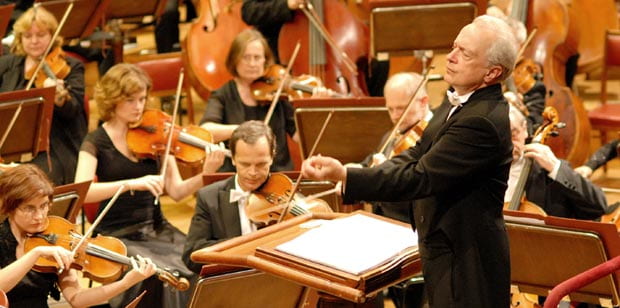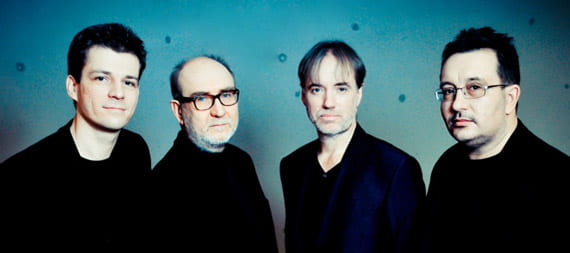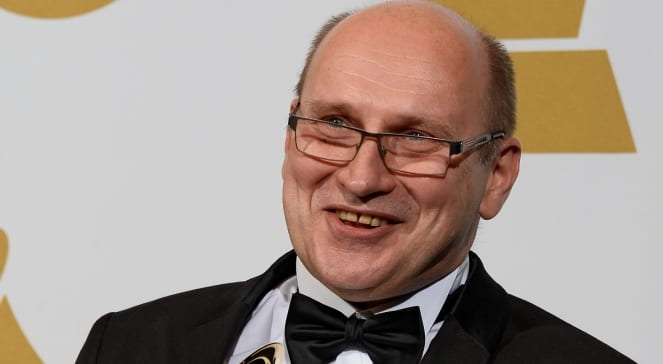Polish Music Newsletter Vol. 20, no. 2
Panufnik Centenary In February
 2014 marks the centenary of acclaimed Polish composer Sir Andrzej Panufnik. Throughout the year many exciting events will take place around the world. Leading orchestras, conductors, chamber groups and soloists and radio stations in several countries and continents are planning Panufnik performances, education events and lectures which will be announced on the dedicated centenary page.
2014 marks the centenary of acclaimed Polish composer Sir Andrzej Panufnik. Throughout the year many exciting events will take place around the world. Leading orchestras, conductors, chamber groups and soloists and radio stations in several countries and continents are planning Panufnik performances, education events and lectures which will be announced on the dedicated centenary page.
The centenary celebrations in the UK—where Panufnik spent half of his life in exile from Communist-controlled Poland—will start officially on February 5th with the London Symphony Orchestra’s performance of Panufnik’s Symphony No.3, Sinfonia Sacra. The LSO will also perform his music in London and in Poland in October 2014.
International Concerts Celebrating Panufnik This Month:
Saturday, February 1 | 7:00 pm
Lutosławski Polish Radio Studio – Warsaw, Poland
Panufnik: Piano Concerto; Ignacy Zalewski – Symphonic Variations (World Premiere); Szymanowski: Symphony No. 2 in B flat major op. 19
Polish Sinfonia Juventus Orchestra / Oskar Jezior, piano / Marzena Diakun, cond.
Info: www.sinfoniaiuventus.pl , www.studianagran.com.pl
Wednesday, February 5 | 6:00 pm
The Barbican – London, UK
Panufnik: Symphony No.3 “Sinfonia Sacra” and Lullaby
London Symphony Orchestra / Anne-Sophie Mutter, violin / Michael Francis, conductor
Info: www.barbican.org.uk
Thursday, February 6 | 7:00 pm
Musica Mundana: Polnisches Institut – Vienna, Austria
Panufnik: Dreamscape / Piano Trio; Lutosławski: Subito; Palester – Selections from Preludes; Szymanowski: Sonata for Violin and Piano
Anna Maria Staśkiewicz, violin / Bartosz Koziak, cello / Jakub Tchorzewski, piano
Info: www.polnisches-institut.at
Saturday, February 8 | 7:00 pm
Łańcuch Festival XI Concert: Lutosławski Polish Radio Studio – Warsaw, Poland
Panufnik: Tragic Overture and Polonia; Tansman: Concerto for Orchestra; Lutosławski – Mała suita (chamber version) and Łańcuch III
Polish Radio Orchestra / Renato Rivolta, cond.
Info: www.polskieradio.pl
Sunday, February 9 | 7:00 pm
Łańcuch Festival XI Concert: Lutosławski Polish Radio Studio – Warsaw, Poland
Panufnik: Autumn Music and Lullaby; Natalya Chepelyuk – Aria II (World Premiere); Kilar – Prelude and Christmas Carol; Lutosławski – Livre pour orchestra and Les espaces du sommeil for baritone and orchestra
National Polish Radio Symphony Orchestra in Katowice (NOSPR) / Alexander Liebreich, cond.
Info: www.nospr.org.pl, www.studianagran.com.pl
February 14 & 15 | 7:30 & 6:00 pm
Filharmonia Narodowa – Warsaw, Poland
Panufnik: Symphony No.5 “Sinfonia di Sfere”
Warsaw Philharmonic Orchestra / Esther Yoo, violin / Jacek Kaspszyk, cond.
Info: filharmonia.pl
Thursday, February 27 | 7:30 pm
Philharmonic Hall – Liverpool, UK
Panufnik: Violin Concerto
Vadim Repin, violin / Royal Liverpool Philharmonic Orchestra / Vasily Petrenko, cond.
Info: www.liverpoolphil.com
[Sources: newsletters.polishculture.org.uk, panufnik.com]
Kolberg Year In February
 Two hundred years ago Oskar Kolberg was born in the village of Przysucha to become one of the most accomplished contributors to Polish culture and one of the most forgotten, as well. Thanks to this exquisite folklorist and ethnographer we know our forefathers’ folk melodies, dances, rituals, customs and beliefs.
Two hundred years ago Oskar Kolberg was born in the village of Przysucha to become one of the most accomplished contributors to Polish culture and one of the most forgotten, as well. Thanks to this exquisite folklorist and ethnographer we know our forefathers’ folk melodies, dances, rituals, customs and beliefs.
To mark the bicentenary of the great researcher this year, Polish parliament’s lower house, the Sejm, has made 2014 the Kolberg Year. February starts the Kolberg Year celebrations in Poland.
A day before the folklorist’s birthday, on February 21, his hometown will host a gala concert, featuring Kolberg’s works performed by Iwona Kowalkowska (soprano), Wojciech Maciejowski (tenor) and Andrzej Tatarski (piano). The audience will also be treated to a performance of the Mogilianie regional ensemble, presenting a selection of folk music of the area of Przysucha and the region of Kraków.
On February 22, the day when Kolberg was born – the Fryderyk Chopin Museum in Warsaw will launch its program titled “Give Kolberg thanks for his laborious work. Oskar Kolberg: ethnographer, musicographer, chopinologist.” Apart from a comprehensive temporary exhibition devoted to Kolberg, the narration of the museum’s permanent collection will be changed to include Kolberg themes.
February 22 will also see the launch of a special GPS application for smartphones enabling users to track and discover places connected with the ethnographer’s life and work. The application, downloadable for free, will be available in Polish and English for Android and, in a few months’ time, for iPhone too.
The official launch of the Kolberg Year will take place on 24 February at the Warsaw Philharmonic, with the participation of Bronisław Komorowski, president of Poland, and Bogdan Zdrojewski, Poland’s Minister of Culture and National Heritage. The gala will feature performances by Wielka Orkiestra Gaców, Trebunie Tutki, Kapela ze Wsi Warszawa, Zbigniew Namysłowski Quintet, and Magdalena Lisak accompanied by the Warsaw Philharmonic Orchestra under Jacek Kaspszyk. On the same day, selected folk artists and ethnographers will be awarded state distinctions and Gloria Artis Medals for their contribution to culture.
Oskar Kolberg has left behind opulent archives documenting the folklore of Polish territories of the 19th century, recorded in 33 volumes of his opus titled “Lud. Jego zwyczaje, sposób życia, mowa, podania, przysłowia, obrzędy, gusła, zabawy, pieśni, muzyka i tańce“ [The people, their customs, way of life, speech, legends, proverbs, rites, pagan ceremonies, games, songs, music and dances], which was published in his lifetime, and the same amount of materials in the form of the so-called “Kolberg files”. Underlying his lifetime of hard work was passion, commitment and a calling that he continued to follow in spite of numerous obstacles he faced. Today his output is instrumental to many researchers – ethnographers and musicologists, and inspirational for many different people.
The Kolberg Year will offer an array of events for different target groups, not only researchers and artists dealing with traditional music. Many projects have been devised specifically for young people, reaching out to them through the Internet and social networks.
For more information on the celebrations, event schedule and news, go to www.kolberg2014.org.pl.
The Kolberg Year Celebrations Office is run by the Institute of Music and Dance in Warsaw. The celebrations are held in association with the Oskar Kolberg Institute, the Forum of Traditional Music, Polish Ethnological Society, Open-Air Museum of Rural Architecture in Radom, Polish Radio, Folk Artists Association, Art Institute of the Polish Academy of Sciences, Polish Composers’ Union, the Fryderyk Chopin Institute in Warsaw, and the National Audiovisual Institute in Warsaw.
February 21, 2014 | 5:00 pm
Concert Launch of the Kolberg Year in Przysucha
Culture Centre – ul. Radomska 9, Przysucha, Poland
Info: www.kolberg2014.org.pl
February 22, 2014 | 5:00 pm
Fryderyk Chopin Museum in Warsaw
Ostrogski Palace – ul. Okólnik 1, 00-368 Warsaw
2013 Year in Review
July – December
Anniversary Year
This year’s Berliner Festspiele included eight works by Witold Lutosławski: Chain II (Aug. 31), Musique funèbre (Sept. 4), Concerto for Orchestra (Sept. 6), Symphony No. 2 (Sept. 7-8), Venetian Games (Sept. 8), Les espaces du sommeil (Sept. 9), Symphony no. 4 (Sept. 12-14), and Mi-parti (Sept. 15-16).
 Pianist Krystian Zimerman gave a rare performance in Poland at the 2013 Warsaw Autumn Festival on September 22, duplicating the premiere of the work on its 25th anniversary. IMiT Dir. Andrzej Kosowski called it “the event of the Lutosławski Year.”
Pianist Krystian Zimerman gave a rare performance in Poland at the 2013 Warsaw Autumn Festival on September 22, duplicating the premiere of the work on its 25th anniversary. IMiT Dir. Andrzej Kosowski called it “the event of the Lutosławski Year.”
Initiated by pianist Maciej Garbowski, ‘The Lutosławski Collective’ explores the relationship between the two creative compositional processes of improvisation and aleatoric techniques, and encourages musicians to take a new look at Lutosławski’s chamber music, with all parts treated as equals.
During October, the 2013 Musical Confrontations Festival at the Stawiska Artists’ Residence focused on Lutosławski, most interestingly with a recreation of the 1942 concert performed there as a pianist in Nazi-occupied Warsaw.
On the occasion of his 80th birthday, Krzysztof Penderecki prepared a new version of the opera The Devils of Loudun in co-production with the Royal Danish Theatre. World premiere: Det Kongelige Teater, Copenhagen—February 12, 2013. Polish premiere: Grand Theatre/National Opera, Warsaw—October 2, 4, 6 and 8, 2013.
On October 15-16, the 2013 Beijing Music Festival (BMF) honored “living legend” of avant-garde music, Krzysztof Penderecki, with two concerts dedicated to his music.
The Academy of Music in Kraków hosted the Chamber Music Festival “Witold Lutosławski in the Musical Culture of Poland and Europe” from November 3-9, featuring soprano Iwona Sobotka, violinist Janusz Wawrowski, Dafô Quartet and Royal String Quartet alongside some of Poland’s greatest Lutosławski scholars.
German Chancellor Angela Merkel stressed the composer’s special ties with German culture in her letter congratulating Penderecki on his 80th birthday, which was published alongside other such recognitions in the program for the Krzysztof Penderecki Festival in Warsaw. The Festival brought together such esteemed international artists as violinist Anne-Sophie Mutter, conductor Krzysztof Urbański and Sinfonia Varsovia.
Awards & Honors
The Witold Lutosławski Society awarded the 2013 Witold Lutosławski stipend to recent Toru Takemitsu Award winner, composer Marcin Stańczyk .
President of France, François Hollande, recognized Polish composer Wojciech Kilar with the Knight of the Legion of Honor Order Award in June 2013, citing the composer’s “unprecedented contribution to world culture and his efforts in building a cultural relationship between Poland and France”.
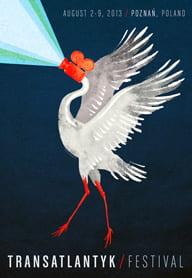 In an August 23 ceremony, composer Elżbieta Sikora was honored with the Neptun Award given by the President of the City of Gdańsk during the Solidary of Arts Festival
In an August 23 ceremony, composer Elżbieta Sikora was honored with the Neptun Award given by the President of the City of Gdańsk during the Solidary of Arts Festival
2013 winners at the Transatlantyk International Film and Music Festival (Poznań, August 2-9):
- Transatlantyk “Young Composer 2013” (60 000 PLN): Xiaotian Shi
- 2nd Prize (30 000 PLN): Lennert Busch
- 3rd Prize (15 000 PLN): Łukasz Pieprzyk
- Honorable Mentions: Cristian Mihail Lepadatu, Jeffrey van Rossum and Mikołaj Stroiński
- Transatlantyk “Instant Composer 2013” (30 000 PLN): Aleksander Dębicz (Poland)
-
- 2nd Prize (15 000 PLN): Jan Miserre (Germany)
- 3rd Prize (7 500 PLN): Radosław Mateja (Poland)
- Honorable Mentions: Michał Wróblewski (Poland) and Paweł Tomaszewski(Poland)
On September 16, winners were announced in the VIIth edition of the Karol Szymanowski Composers Competition, organized by ZAiKS:
- First Prize: Jéux Varsoviens by Grzegorz Duchnowski (15,000 PLN)
- Second prize: Ballada of Ignacy Zalewski (12,000 PLN)
- Third prize, ex aequo: Symphony by Grzegorz Duchnowski and Tre Episodi by Szymon Godziemby-Trytka (7,000 PLN each)
- Honorary Distinction: Illusions by Kamil Kosecki (4,000 PLN)
On October 1, the 2013 ‘Koryfeusz’ Polish Music Awards were announced during a gala concert in the Polish Radio Lutosławski Concert Studio in Warsaw:
- Personality of the Year: Piotr Beczała, tenor
- Event of the Year: Grand Opening of the European Penderecki Centre for Music in Lusławice (May 21, 2013)
- Honorary Award: Prof. Jan Ekier, musicologist and Chopin scholar
The 2013 Paderewski Youth Piano Competition auditions were held at Cass Winery on Saturday, October 26. Winners were (pictured L-R above): Bella Oldenburg (14, Honorable Mention); Ivan Davidek (14, Honorable Mention); Sydney Haughian (13, Third Place – Junior Division); Daniel Ha (13, First Place – Junior Division); Kevin Park (12, Second Place – Junior Division); and Evan Lin (16, Paderewski Legacy Award)
Premieres
The 2013 Warsaw Autumn Festival (September 20-28) featured World Premieres of works by 17 different Polish composers – for the full list, visit: ../news/sep13.html#news
 Na (2013) by Mikołaj Laskowski was premiered by its commissioning ensemble, Orkest de Ereprijs and Chamber Concerto (2013) by Dariusz Przybylski was premiered by its commissioning ensemble, Internationale Ensemble Modern Akademie, at the prestigious Gaudeamus Muziekweek 2013 Festival in September.
Na (2013) by Mikołaj Laskowski was premiered by its commissioning ensemble, Orkest de Ereprijs and Chamber Concerto (2013) by Dariusz Przybylski was premiered by its commissioning ensemble, Internationale Ensemble Modern Akademie, at the prestigious Gaudeamus Muziekweek 2013 Festival in September.
The World Premiere of Symphony No. 3 by Wojciech Ziemowit Zych was held on September 8 by the Wrocław Philharmonic at the 48th Wratislavia Cantans International Festival.
On November 29, the Artur Rubinstein Philharmonic Orchestra (ARPO) in Łódź hosted the premieres of “Three Concertos” written by composers belonging to different generations and contexts: Andrzej Kwieciński (b. 1984) – Concerto. Re maggiore for harpsichord and orchestra, Bronisław Kazimierz Przybylski (1941–2011) – North for saxophone and orchestra, and Paweł Mykietyn (b. 1971) – Concerto for Flute and Orchestra.
On December 14 in the Stern Auditorium of New York City’s Carnegie Hall, world renowned violinist Anne-Sophie Mutter performed the World Premiere of a new work by Krzysztof Penderecki, La Follia for Solo Violin
PMC News
The third biennial installment of the Cultural Exchange Program between the Paderewski Festival in Paso Robles, California and the Province of Tarnów, Poland was held during the last 10 days of June 2013 in Paderewski’s former manor house in Kąśna Dolna. Two 13-year old pianists from California’s Central Coast—Daniel Ha and Jack Raventos—travelled to Poland to participate in an intensive program of piano workshops, master classes, and chamber music sessions.
The 2013 Paderewski Lecturer was Krzesimir Dębski, a prominent Polish composer who is also a virtuoso violinist and pianist, and a celebrated orchestral conductor and celebrates his 60th birthday this year. While in California, Dębski and his wife, Anna Jursztowicz, also performed at private fundraisers and the Paderewski Festival in Paso Robles, as well as participating in film screenings of Please find – Henryk Mikołaj Górecki and Why Competitions?
 Events of the 2013 Paderewski Festival in Paso Robles: documentary film screening of Paderewski—The Man of Action, Success and Fame; exhibit on Paderewski’s Heart; piano master class; lecture on Paderewski in Paso Robles; chamber concert by Panic Duo with works by Dębski, Szymanowski and Wieniawski; a Jazz and Film Music Concert featuring Krzesimir Dębski and Anna Jurksztowicz with Darek “Oles” Oleszkiewicz and friends; Youth Piano Competition Winners’ Recital; and a Gala Concert with Karol Radziwonowicz of solo piano works by Chopin and Paderewski.
Events of the 2013 Paderewski Festival in Paso Robles: documentary film screening of Paderewski—The Man of Action, Success and Fame; exhibit on Paderewski’s Heart; piano master class; lecture on Paderewski in Paso Robles; chamber concert by Panic Duo with works by Dębski, Szymanowski and Wieniawski; a Jazz and Film Music Concert featuring Krzesimir Dębski and Anna Jurksztowicz with Darek “Oles” Oleszkiewicz and friends; Youth Piano Competition Winners’ Recital; and a Gala Concert with Karol Radziwonowicz of solo piano works by Chopin and Paderewski.
News
 On August 29, the 100th birthday of Jan Ekier—respected pedagogue and editor-in-chief of the new National Edition of Chopin’s Works—was celebrated by the National Chopin Institute (NIFC) as part of the ‘Chopin and His Europe’ Festival in Warsaw.
On August 29, the 100th birthday of Jan Ekier—respected pedagogue and editor-in-chief of the new National Edition of Chopin’s Works—was celebrated by the National Chopin Institute (NIFC) as part of the ‘Chopin and His Europe’ Festival in Warsaw.
On September 1, Maestro Jacek Kasprzyk assumed the role of Artistic Director of the Warsaw National Philharmonic.
 The Copernicus Endowment for Polish Studies at University of Michigan in Ann Arbor celebrated its 40th Anniversary with concerts like The Musical Beauty of Baroque Poland, Niech Żyje Polska: Long Live Poland!, and Hasidic and jazz music by Shofar in November.
The Copernicus Endowment for Polish Studies at University of Michigan in Ann Arbor celebrated its 40th Anniversary with concerts like The Musical Beauty of Baroque Poland, Niech Żyje Polska: Long Live Poland!, and Hasidic and jazz music by Shofar in November.
The 14th Los Angeles Polish Film Festival (October 8-17) featured several wonderful music-related films: My Father’s Bike, Why Competitions?, The Ballad of Nameless Joe, Once There was a King, Lullaby, and Dr. Jazz, as well as films scores by such renowned composers as Leszek Możdżer, Jan A.P. Kaczmarek and Krzystof Komeda.
Nearly the entire compositional output of Witold Lutosławski, Henryk Mikołaj Górecki and Krzysztof Penderecki—the leaders of Polish contemporary music—is now available on a new website created by the National Audiovisual Institute (NInA): trzejkompozytorzy.pl (Pol) / threecomposers.pl (Eng)
Recordings
Entitled Wojciech Kilar. Credo, a new documentary by Violetta Rotter-Kozera and Zdzisław Sowiński focused on Kilar’s life and work as well as his creative and personal choices was released by TVP Katowice.
 Mezzo-soprano Liliana Górska received high praise for her CD of song cycles by four contemporary Polish composers: Tadeusz Baird, Zygmunt Krauze, Joanna Bruzdowicz and Juliusz Łuciuk (Acte Prealable AP0274).
Mezzo-soprano Liliana Górska received high praise for her CD of song cycles by four contemporary Polish composers: Tadeusz Baird, Zygmunt Krauze, Joanna Bruzdowicz and Juliusz Łuciuk (Acte Prealable AP0274).
 In their latest recording on the Accord label, Rafał Augustyn: Do ut des—Music for and with quartet (Accord ACD 165-2), the Silesian String Quartet presents a large portion of Augustyn’s chamber music.
In their latest recording on the Accord label, Rafał Augustyn: Do ut des—Music for and with quartet (Accord ACD 165-2), the Silesian String Quartet presents a large portion of Augustyn’s chamber music.
 El Derwid – Plamy na słońcu [Sunspots] (CD Accord ACD 192): Agata Zubel, Cezary Duchnowski and Andrzej Bauer collaborated on this premiere recording of Witold Lutoslawski’s pop hits written under the pseudonym Derwid.
El Derwid – Plamy na słońcu [Sunspots] (CD Accord ACD 192): Agata Zubel, Cezary Duchnowski and Andrzej Bauer collaborated on this premiere recording of Witold Lutoslawski’s pop hits written under the pseudonym Derwid.
 Trio Alegrija uncovered a Polish gem with their new recording Jan Baptysta Kleczyński: 6 String Trios Op. 4, vol. 2 (Acte Prealable AP0265).
Trio Alegrija uncovered a Polish gem with their new recording Jan Baptysta Kleczyński: 6 String Trios Op. 4, vol. 2 (Acte Prealable AP0265).
 Standing at the heart of award-winning Polish composer Krzysztof Meyer’s output are his symphonies and string quartets, and Vol. 4 of the Wieniawski String Quartet’s series on Meyer’s string quartets explores the important first four quartets on MEYER, K.: String Quartets, Vol. 4 (Naxos Records 8.573165)
Standing at the heart of award-winning Polish composer Krzysztof Meyer’s output are his symphonies and string quartets, and Vol. 4 of the Wieniawski String Quartet’s series on Meyer’s string quartets explores the important first four quartets on MEYER, K.: String Quartets, Vol. 4 (Naxos Records 8.573165)
Performances
 Held from July to November, the first edition of the Emanations Festival featured over 80 concerts and opera performances in celebration of Krzysztof Penderecki’s 80th birthday throughout the Małopolska region.
Held from July to November, the first edition of the Emanations Festival featured over 80 concerts and opera performances in celebration of Krzysztof Penderecki’s 80th birthday throughout the Małopolska region.
On September 15, pianists gathered at Yale University’s Sudler Hall to celebrate the 75th birthday of Professor Emerita Madeline Forte with works by Szymanowski, Bacewicz, Rachmaninov, Liszt, Chopin and a new work by Krystian Kielb, Rector of the Wrocław Karol Lipiński Academy in Warsaw.
 The Janusz Prusinowski Trio thrilled audiences with their uniquely modern interpretations of village music from central Poland during their US tour in September and October.
The Janusz Prusinowski Trio thrilled audiences with their uniquely modern interpretations of village music from central Poland during their US tour in September and October.
Marcin Masecki, Maciej Obara, Piotr Damasiewicz and Gerard Lebik performed in Tokyo’s Cotton Club during the Tokyo Jazz Festival, one of the most important such festivals in Asia
 The Sacrum Profanum Festival (September 15-22, Kraków) featured works by Witold Lutosławski, Steven Reich and Marcin Stańczyk juxtaposed with performances by Frank Zappa, Portishead and Aphex Twin.
The Sacrum Profanum Festival (September 15-22, Kraków) featured works by Witold Lutosławski, Steven Reich and Marcin Stańczyk juxtaposed with performances by Frank Zappa, Portishead and Aphex Twin.
On August 23, Maestro Antoni Wit and the Warsaw National Philharmonic Orchestra made a stellar debut at the 2013 BBC Proms Festival—which was focused on Polish music during Lutosławski’s centenary year—meeting with enthusiastic praise from the The Times of London, The Telegraph and The Guardian .
The 95th anniversary of the Polish Authors’ Rights Society (ZAiKS) was celebrated at the Penderecki European Center for Music in Lusławice on September 13.
NeoQuartet celebrated the 70th birthday of composer Elżbieta Sikora with a jubilee concert on October 6 in Gdańsk.
Continuing to host the most interesting Polish experimental music acts, editions of the Unsound Festival were held in London from September 26-29 and at home base in Kraków from October 13-20.
The 2013-2014 season of the Metropolitan Opera opened on September 23 with Polish musicians baritone Mariusz Kwiecień and tenor Piotr Beczała in leading roles alongside soprano Anna Netrebko and conductor Valery Gergiev in an opulent production of Tchaikovsky’s Eugene Onegin.
In November, the Panic Duo gave several recitals in Los Angeles devoted entirely to Polish music—Sonata for Violin and Piano (2013) by Dębski, Sonata No. 1 for Violin and Piano (1953) by Penderecki, Subito (1992) by Lutosławski, Cantabile (2000) by Dębski, and Mythes, Op. 30 (1915) by Szymanowski.
Gedymin Grubba, a prominent Polish organist, composer, and conductor, toured the US in September and October.
 The Canadian ARC Ensemble paid tribute to three Polish composers during “Poles Apart: Chamber Music from the Garden of Exile” at Zipper Hall in Los Angeles on November 17: Mieczysław Weinberg (1919-1996) – Piano Quintet, Op. 18; Szymon Laks (1901-1983) – Piano Quintet; and Jerzy Fitelberg (1903-1951) – Sonatina for Two Violins.
The Canadian ARC Ensemble paid tribute to three Polish composers during “Poles Apart: Chamber Music from the Garden of Exile” at Zipper Hall in Los Angeles on November 17: Mieczysław Weinberg (1919-1996) – Piano Quintet, Op. 18; Szymon Laks (1901-1983) – Piano Quintet; and Jerzy Fitelberg (1903-1951) – Sonatina for Two Violins.
Vocalist Aga Zaryan, bassist Darek ‘Oles’ Oleszkiewicz, guitarist Larry Koonse and percussionist Munyungo Jackson brought their program “Remembering Nina & Abbey” to stages in LA, San Francisco and San Diego this December
We Remember…
Maestro Marek Tracz—conductor of Opole Philharmonic, rector of the Wrocław Academy of Music and conductor and artistic director of Wrocław Opera—passed away on June 6, 2013 at 77 years old.
PMC News
Polish Jazz Concert At USC On March 29
On a Polish Jazz Note—Kaper, Wars and Jarczyk at USC
Jazz in Poland has surprisingly strong and well-established roots. Already in the late 1920s, various Warsaw night clubs and cabarets featured bands styled on the American swing ensembles, including the Karasiński and Kataszek Jazz-Tango Orchestra and the Petersburski-Gold Orchestra. With a charming title, the 1928 New York Times Square Foxtrot is the first official jazz composition penned by Polish composer, Henryk Wars (1902-1977), known as Henry Vars after he emigrated to the United States in 1947.
Jazz was quickly assimilated in Poland with a variety of venues in Warsaw, Kraków, Poznań, and Lwów, and music by Wars, Bronisław Kaper (1902-1983), and Jerzy Petersburski (1895–1979) from the 1930s betrays a strong influence of American composers and performers, including Gershwin, Goodman and the Paul Whiteman Band. Polish jazzmen were also active in providing film scores for the burgeoning Polish film industry, creating the first Polish jazz opera that was premiered by the Polish National Opera in 1934, and producing a multitude of recordings for the Syrena Records Company, established 1904.
The careers of Henryk Wars and Bronisław Kaper eventually led the two composers to Hollywood. Kaper arrived in Los Angeles after meeting Louis B. Mayer in Paris in 1935. Deeply impressed by Kaper’s hit song Ninon, co-written with Walter Jurmann, Mayer offered Kaper a long-term MGM contract, jumpstarting Kaper’s career in Hollywood.
Caught by the outbreak of World War II in Warsaw, Henryk Wars eventually escaped to Lwów and later was able to leave the Soviet Union with the Anders army. After several years of leading the Polish Parade ensemble that serenaded the Allied troops, by 1950 Wars managed to reestablish his music career in America.
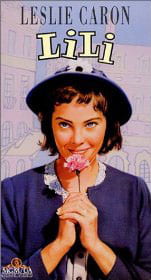 The Polish Jazz Concert presented by the Polish Music Center at USC on March 29 will showcase music written by Kaper and Wars during their Hollywood period. As the first Polish composer to earn the Academy Award for the music in Lili (1953) that featured an all-time hit, Hi-Lili, Hi-Lo, Kaper wrote scores for over 150 films and a great number of memorable songs. Some of them, including You’re All I Need (from the 1935 MGM feature Escapade), Gloria (from the 1960 MGM feature Butterfield 8), Blue Venetian Waters (from the 1937 Marx Brothers comedy A Day at the Races), While My Lady Sleeps (from The Chocolate Soldier, 1941), and On the Green Dolphin Street (from Lana Turner’s 1947 classic, Green Dolphin Street), will be heard at the PMC concert.
The Polish Jazz Concert presented by the Polish Music Center at USC on March 29 will showcase music written by Kaper and Wars during their Hollywood period. As the first Polish composer to earn the Academy Award for the music in Lili (1953) that featured an all-time hit, Hi-Lili, Hi-Lo, Kaper wrote scores for over 150 films and a great number of memorable songs. Some of them, including You’re All I Need (from the 1935 MGM feature Escapade), Gloria (from the 1960 MGM feature Butterfield 8), Blue Venetian Waters (from the 1937 Marx Brothers comedy A Day at the Races), While My Lady Sleeps (from The Chocolate Soldier, 1941), and On the Green Dolphin Street (from Lana Turner’s 1947 classic, Green Dolphin Street), will be heard at the PMC concert.
The March 29 program will also include several hits by Henryk Wars, including Już nie zapomnisz mnie [You’ll Never Forget Me] originally sung by Aleksander Żabczyński in a 1938 classic, Zapomniana melodia [A Forgotten Melody], and continue with Sleep My Child, a touching lullaby written in 1947 and dedicated to orphaned children all over the world. The three other Wars songs, all dating from the early 1950s, Never Say You’ll Never Fall in Love, More or Less, and I Remember, were originally introduced to the American public by such noted performers as Dennis Day, Margaret Whiting, Doris Day, and Mel Tormé.
All of the above classics will be presented in new arrangements for jazz trio and string quartet, composed especially for this concert by Jan Jarczyk, pianist, composer, arranger and professor of music at McGill University’s Shulich School of Music in Montreal, Canada. With over twelve CD recordings, Jarczyk has performed worldwide and received numerous awards, including the Grand Prix in Lyon, France in 1974, and the SOCAN award for Best Jazz Composition during the Montreal Jazz Festival in 1999. Jan Jarczyk’s musical accomplishments were recognized by the Polish government with the Silver Cross of Merit in 2011 and with a 2011 Grammy Award nomination.
The March 29 Polish Music Concert will also feature several original compositions by Jarczyk, including There is Always Time, Round, Round and Round, Conversation Tune, and Little String Quartet No. 1, among others. With this selection of works by one of numerous contemporary Polish composers who embraced the genre, we can satisfactorily conclude that Polish jazz not only thrives but also serves as a guiding light for jazz musicians around the world. The following quote from Michael Keefe, a noted American critic, sums it up well:
While America waits for the next big thing in jazz, they should turn to the east, to Poland, a country that has been making consistently great music for 40 plus years. It is criminal that American jazz fans are so completely unaware of this music. If you are expecting some sort of abrasive free blowing or watered down post-bop, you are in for a big surprise. This music encompasses every genre of jazz, even genres that don’t exist. Regardless of the style, this music is never, never pretentious and has more soul, whether it’s Slavic soul or whatever, than what is passing for jazz in the States. The Polish version of jazz is as pure as music can be. It is not blending different types of music, i.e., jazz, ethnic folk, classical to create some kind of hybrid; it is a totally seamless combination of sounds based on the love of creative music and the joy that the music bestows on the listeners. In a nation with such a turbulent recent past, it is hard to imagine that these extraordinary musicians devoted themselves to this music for any reason other than love of jazz. […] Polish jazz could make “jazz” popular music again in America, if only Americans had the chance to hear it. (From the liner notes of The Best of Polish Jazz – 2 CDs, 2005)
Recent Donations
Donated by Prof. Nick Strimple to the PMC Library in January 2014:
• Tadeusz Baird: Goethe-Briefe – Cantata for Baritone, Mixed Choir and Orchestra
This score joins a number of other scores of choral music by Polish composers donated by USC Professor Nick Strimple to our library. Once again, thank you for your friendship, generosity, and continued support of the Polish Music Center.
From Prof. Jan Jarczyk in Montreal, Canada:
• Jan Jarczyk: Round, Round & Round—Music for jazz Trio & String Quartet published by GOWI Records—CDG 70 CD
• Jan Jarczyk: Full Circle—Odd Sound ODS-5 CD
From Henryk Martenka, Director of the International Paderewski Piano Competition in Bydgoszcz, Poland:
• Henryk Martenka: Muzyka w pałacu—Music in the Palace. This is a charming (and usefully bilingual) book, lavishly illustrated with photos from the summer sessions of the Paderewski Music Academy, held at the Ostromecko Palace, located between Bydgoszcz and Toruń. Since 2006, selected piano students from all over the world came to Ostromecko for master classes and music workshops conducted by Jan Zarzycki, Anna Mróz, Jan Jakub Bokun, Przemysław Fiugajski, Ilya Scheps, Andrzej Jasiński, Robert McDonald, Katarzyna Popowa-Zydroń, Andrea Bonita, Einar Stee-Nøkleberg, Mariusz Klimsiak, and Toruń Symphony Orchestra.
• Catalogue of the Ninth International Paderewski Piano Competition, held in Bydgoszcz, Poland, 3-17 November 2013
From Greg Banaszak, virtuoso saxophonist, based in Cleveland Ohio:
Greg Banaszak visited USC recently with a saxophone master class and a recital. He also donated 3 of his CD recordings to the PMC library:
• Alan Hovhaness: Concerto for Soprano Saxophone and Orchestra, Op. 344 with the Eastern Music Festival Orchestra led by Maestro Gerard Schwarz
• Paweł Łukaszewski: Trinity Concerto for Alto Saxophone and String Orchestra with the Podlasie Philharmonic Orchestra led by Maestro Piotr Borkowski
• I’ll Remember April: Bird with Strings Revisited – a CD of standards with jazz legend, Charlie “Bird” Parker. Gorzów Philharmonic is led by Maestro Piotr Borkowski
Thanks for your generous donations. Dziękujemy!
News
Bruzdowicz Premiere In Rzeszów
 Filharmonia Podkarpacka, also known as the Rzeszów Philharmonic, presented a concert commemorating pianist and composer, Władysław Szpilman (1911-2000). Titled “Tych lat nie odda nikt” [Those times won’t return], the first half of the program was devoted to Szpilman’s brief Uwertura na orkiestrę [Overture for Orchestra] as well as his Concertino for Piano and Orchestra. However the pride of place on this part of the program was given to the two-movement Concertino for Piano and Orchestra by Joanna Bruzdowicz (b. 1943), a work dedicated to Władysław Szpilman. Jacek Rogala led the Rzeszów Philharmonic and Marek Bracha was piano soloist in both Szpilman’s and Bruzdowicz’s Concertinos.
Filharmonia Podkarpacka, also known as the Rzeszów Philharmonic, presented a concert commemorating pianist and composer, Władysław Szpilman (1911-2000). Titled “Tych lat nie odda nikt” [Those times won’t return], the first half of the program was devoted to Szpilman’s brief Uwertura na orkiestrę [Overture for Orchestra] as well as his Concertino for Piano and Orchestra. However the pride of place on this part of the program was given to the two-movement Concertino for Piano and Orchestra by Joanna Bruzdowicz (b. 1943), a work dedicated to Władysław Szpilman. Jacek Rogala led the Rzeszów Philharmonic and Marek Bracha was piano soloist in both Szpilman’s and Bruzdowicz’s Concertinos.
The second half of the program featured a number of songs penned by Szpilman throughout his life, including W małym kinie [In a small cinema theatre], Nie ma szczęścia bez miłości [There’s no happiness without love], or Pójdę na stare miasto [I’ll visit the Old Town], made popular by such Polish artists as Irena Santor or Mieczysław Fogg. For this part of the program, the Adria Orchestra (violinists Grzegorz Lalek, Annda Wandtke, pianist Urszula Borkowska, guitarist Piotr Malicki, accordionist Rafał Grząka, drummer Piotr Maślanka, and bassist Sebastian Wypych) accompanied the vocal soloist, Lala Czaplicka.
[Source: http://www.filharmonia.rzeszow.pl/ ]
Krzesimir Dębski In Miami
![]() Florida International University hosted a concert of contemporary music on Friday, January 31 at its flagship venue, Wertheim Performing Arts Center Concert Hall. Part of the New Music Miami ISCM Festival, the concert featured a specially commissioned work for orchestra by Krzesimir Dębski, titled New Miami Sounds. The composer led the FIU Symphony Orchestra in the world premiere of his piece. Work by Rick Snow, Federico Garica, Fredrick Kaufman, Juan Vasquez, Orlando Jacinto Garcia, and Paula Matthusen rounded off the program. Other performers on this concert included the NODUS Ensemble and the Amernet String Quartet.
Florida International University hosted a concert of contemporary music on Friday, January 31 at its flagship venue, Wertheim Performing Arts Center Concert Hall. Part of the New Music Miami ISCM Festival, the concert featured a specially commissioned work for orchestra by Krzesimir Dębski, titled New Miami Sounds. The composer led the FIU Symphony Orchestra in the world premiere of his piece. Work by Rick Snow, Federico Garica, Fredrick Kaufman, Juan Vasquez, Orlando Jacinto Garcia, and Paula Matthusen rounded off the program. Other performers on this concert included the NODUS Ensemble and the Amernet String Quartet.
[Source: http://www.newmusicmiami.org/]
Opałka Premiere In Kielce
 Tomasz Opałka’s new work Entrada Concertante for ensemble of soloists and orchestra was world premiered by the Oskar Kolberg Philharmonic in Kielce in February 7, 2014. Entrada Concertante is part of the “Commissioned Compositions” program financed by the Ministry of Culture (MKiDN) and administered by the Institute of Music and Dance (IMiT). The premiere was conducted by Krzysztof Jakub Kozakiewicz, who is currently serving with the Kielce Philharmonic as a part of IMiT’s “Conductor-in-Residence” program. Also performed that evening were Karłowicz’s Violin Concerto op. 8 and Brahms’s Symphony No. 2 op. 73.
Tomasz Opałka’s new work Entrada Concertante for ensemble of soloists and orchestra was world premiered by the Oskar Kolberg Philharmonic in Kielce in February 7, 2014. Entrada Concertante is part of the “Commissioned Compositions” program financed by the Ministry of Culture (MKiDN) and administered by the Institute of Music and Dance (IMiT). The premiere was conducted by Krzysztof Jakub Kozakiewicz, who is currently serving with the Kielce Philharmonic as a part of IMiT’s “Conductor-in-Residence” program. Also performed that evening were Karłowicz’s Violin Concerto op. 8 and Brahms’s Symphony No. 2 op. 73.
Friday, February 7, 2014 | 7:00 pm
Premiere of Entrada Concertante by Tomasz Opałka
Kielce Philharmonic Hall
ul. Żeromskiego 12, 25-369 Kielce, Poland
[Source: imit.org.pl, filharmonia.kielce.com.pl]
Polish Music At The Olympics
The complementary harmony of body and soul that builds man’s condition was already recognised by the ancient Greeks, who accompanied the Olympic Games with music competitions. As a manner of reference to that idea, the Ludwig van Beethoven Association, together with the Polish Olympic Committee and the Russian Concert Agency, will present a symphonic concert on February 9, 2014, as part of the 7th Winter International Arts Festival in Sochi. The festival, under the artistic directorship of the world-famous Russian artist Yuri Bashmet, will accompany the 22nd Winter Olympics.
Yuri Bashmet, referred to as “the Paganini of the viola,” will have a double role during the event: as a conductor, he will lead the first part of the concert, and as a soloist, he will perform in the second part. Under his baton, the music-lovers will listen to Mozart’s Piano Concerto in C major K. 467, and to the song cycle Les Illuminations by Benjamin Britten. The soloists – the Turkish pianist and composer Fazil Say, and the English tenor Ian Bostridge – will be accompanied by the New Russia State Symphony Orchestra.
The second part of the concert, directed by the Polish conductor Maciej Tworek, will be entirely dedicated to the music of Polish composers: Krzysztof Penderecki’s Double Concerto for Violin, Viola and Orchestra, starring Yuri Bashmet and Agata Szymczewska, and Grażyna Bacewicz’s Concerto for String Orchestra. The very interesting program of the event will evoke the spirit of noble competition, and the strong Polish accent will support the Polish Olympic Team.
[Source: beethoven.org.pl]
Warsaw Phil Celebrates Wit & Rowicki
The Warsaw National Philharmonic celebrated the 70th birthday and 50th year of artistic activity of its former Artistic Director, maestro Antoni Wit, on February 7 and 8, 2014. With a program encompassing great symphonies by Szymanowski, Brahms and Strauss, the concert was performed by the Warsaw Philharmonic Orchestra and Choir with the guest of honor on the conductor’s stand. Guest artists include Iwona Hossa – soprano, Ewa Marciniec – alto, and Jarosław Bręk – bass-baritone.
February 7 & 8, 2014 | 7:30 & 6:00 pm
Antoni Wit’s 70th Birthday – Great Symphonies Concert
Warsaw Philharmonic Orchestra & Choir / Iwona Hossa – soprano / Ewa Marciniec – alto / Jarosław Bręk – bass-baritone / Antoni Wit – conductor
National Philharmonic Hall – ul. Jasna 5, Warsaw, Poland
Info & tickets: filharmonia.pl
Rowicki Centenary
 On February 21-22, the Warsaw National Philharmonic will celebrate the centenary of conductor Witold Rowicki (1914-1989)—who reorganized the National Phil after WWII, gave it its present-day, modern dimension, and served as Artistic Director of the institution for nearly 25 years (1950-1955 and 1958-1977)—with a concert of great symphonies and violin concertos by Szymanowski, Rowicki and Brahms. Current Artistic Director Jacek Kaspszyk will serve as conductor, leading guest artists Aleksandra Kuls – violin and Leszek Wachnik – bassoon.
On February 21-22, the Warsaw National Philharmonic will celebrate the centenary of conductor Witold Rowicki (1914-1989)—who reorganized the National Phil after WWII, gave it its present-day, modern dimension, and served as Artistic Director of the institution for nearly 25 years (1950-1955 and 1958-1977)—with a concert of great symphonies and violin concertos by Szymanowski, Rowicki and Brahms. Current Artistic Director Jacek Kaspszyk will serve as conductor, leading guest artists Aleksandra Kuls – violin and Leszek Wachnik – bassoon.
February 21 & 22 | 7:30 & 6:00 pm
Witold Rowicki Centenary Symphonic concert
Warsaw Philharmonic Orchestra / Aleksandra Kuls – violin / Leszek Wachnik – bassoon / Jacek Kaspszyk – cond.
National Philharmonic Hall – ul. Jasna 5, Warsaw, Poland
[Sources: filharmonia.pl, nytimes.com, musicarena.pl]
Silesian Quartet Celebrates 35 Years
The Silesian Quartet [Kwartet Śląski], one of Poland’s leading string quartets, will celebrate its 35th anniversary at a concert in Polish Radio’s Witold Lutosławski’s Studio on February 16, 2014. On this special occasion members of the Silesian Quartet have invited the prominent Polish pianist Wojciech Świtała to joint them in Cesar Franck’s Piano Quintet in F minor. The program also includes string quartets by Claude Debussy and Andrzej Panufnik.
The Silesian Quartet— Szymon Krzeszowiec, 1st violin, Arkadiusz Kubica, 2nd violin, Łukasz Syrnicki, viola and Piotr Janosik, cello—was founded in 1978 by a group of students from the Karol Szymanowski Academy of Music in Katowice. Its repertoire includes over 400 pieces of chamber literature, of which almost 300 are by 20th-century composers. The quartet has premiered around 70 works by Polish and foreign composers, many of which have been dedicated to it. It has given over 1, 000 concerts in most European countries, the United States, Canada, Mexico, Japan, Hong-Kong and South Korea. It has performed at many prestigious festivals in Poland and abroad and many of its recordings have won awards. The discography of the Silesian Quartet includes complete string quartets by Aleksander Tansman, Karol Szymanowski and Igor Stravinsky, as well as works by Henryk Mikołaj Górecki, Krzysztof Penderecki and Zygmunt Krauze. In 1993 the Silesian Quartet launched an annual chamber music festival. After eleven years at Rybna Palace (near Tarnowskie Góry), in 2004 the event moved to Polish Radio Katowice. The ensemble’s honours include the Gold Cross of Merit (1999), a prize for outstanding services for the Silesian Province (2004) and the ‘Gloria Artis’ Medal of Cultural Merit (2008).
An 8-CD album has been released by the ‘Musica Pro Bono’ Foundation and Polish Radio Katowice to mark the 35th anniversary of the Quartet. It was launched on November 27 during the 2013 International ‘Silesian Quartet and its Guests’ Chamber Music Festival.
Wojciech Świtała is a graduate of the Karol Szymanowski Academy of Music in Katowice, where he studied with Professor Józef Stompel. In 1991-1996 he developed his skills under the guidance of Karl-Heinz Kammerling, André Dumortier and J.C. Vanden-Eynden. He is a prizewinner of several international competitions, including those in Bardolino, Italy (First Prize), Paris (the M. Long and J. Thibaud Competition; II Grand Prix, an audience award and the award for the best European pianist) and Montreal. He received the award for the best performance of a polonaise at the 11th Chopin Competition in Warsaw. Foreign tours have taken him to most European countries, Argentina, Marocco, United Arab Emirates, Libya, the United States and Canada. He has made numerous recordings, many of which have received prestigious awards. In 2000 and 2005 his CDs received Grand Prix du Disque Frédéric Chopin. He also won the Fryderyk Award of the Polish recording industry (2002). In 2003 he recorded Debussy’s Preludes for BeArTon and the complete violin sonatas by Brahms for Sony Music Polska (with Szymon Krzeszowiec). His discography also includes Juliusz Zarębski’s works recorded with the Royal String Quartet in Super Audio technology and Chopin’s Preludes recorded for the National Chopin Institute on a Pleyel dating from 1884. He is currently a Professor at the Music Academy in Katowice.
February 16, 2014 | 7:00 pm
Silesian Quartet Celebrates 35 Years
Lutosławski Polish Radio Studio
ul. Z. Modzelewskiego 59, Warsaw, Poland
Tickets: 20 PLN, available at sklep.polskieradio.pl or one hour before concert at the box-office
[Sources: studianagran.com.pl, silesian-quartet.art.pl]
A Fascinating Exploration Of Penderecki
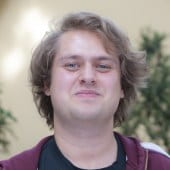 Notes on Penderecki authored by Filip Lech [right], translated into the English and edited by Paulina Schlosser, provide yet another extensive biographical note on the composer. Illustrated by photos and video clips, the article describes Penderecki’s youth and education (including music lessons), and provides some insights on the process of composing. Such works as Threnody to the Victims of Hiroshima, a soundtrack to the film The Saragossa Manuscript, or the Resurrection Piano Concerto are given additional insights with quotes from the composer. Family life, conducting and gardening also get mentioned as part of the everyday life mosaic of this fascinating musician who celebrated his eightieth birthday last year.
Notes on Penderecki authored by Filip Lech [right], translated into the English and edited by Paulina Schlosser, provide yet another extensive biographical note on the composer. Illustrated by photos and video clips, the article describes Penderecki’s youth and education (including music lessons), and provides some insights on the process of composing. Such works as Threnody to the Victims of Hiroshima, a soundtrack to the film The Saragossa Manuscript, or the Resurrection Piano Concerto are given additional insights with quotes from the composer. Family life, conducting and gardening also get mentioned as part of the everyday life mosaic of this fascinating musician who celebrated his eightieth birthday last year.
[Source: http://culture.pl/en/]
Lipiński’s Strad Stolen In Milwaukee
On January 27, 2014, a Stradivarius violin once owned by Polish virtuoso Karol Lipiński (1790-1861) was stolen from Frank Almond, concertmaster of the Milwaukee Symphony Orchestra. Details below are from the website of the external service of Polskie Radio, thenews.pl:
The violinist was attacked by two thieves with an electric stun gun after a performance in suburban Milwaukee. According to local police, the instrument was the primary target of the robbery.
 Made in 1715 and known as the Lipiński Stradivarius, it is said to be worth $5 million to $10 million. The FBI has entered the instrument into its international art theft database and is one of around 600 violins, violas and cellos built by the famous Italian maker Antonio Stradivari that are still in existence.
Made in 1715 and known as the Lipiński Stradivarius, it is said to be worth $5 million to $10 million. The FBI has entered the instrument into its international art theft database and is one of around 600 violins, violas and cellos built by the famous Italian maker Antonio Stradivari that are still in existence.
On February 6, the Milwaukee Police found the instrument in a suitcase hidden in the attic of a suburban Milwaukee residence. The violin was in good condition and two of the three suspects were arrested by FBI and local police.
In December 2011, Mr. Almond appeared in concerts and master classes in Poland to commemorate the 150th anniversary of Karol Lipiński performing on his former violin. He has recorded a CD dedicated to the particular musical history associated with this instrument, entitled “A Violin’s Life: Music for the ‘Lipiński’ Stradivari” (Avie Records, 2013)
[Source: http://articles.chicagotribune.com]
PMA Pulaski Day Scholarship Opportunity In Chicago
 The Polish Museum of America (PMA) is pleased to announce The Polish Museum of America Pulaski Day Scholarship Program. The scholarship recipients will be introduced at the annual official State of Illinois Pulaski Day Celebration to be held on Monday, March 3, 2014 in the Sabina P. Logisz Great Hall of the PMA during the 10 a.m. program. The PMA will select two recipients. Each will receive a $1,000 scholarship applicable for the 2014-2015 school year. High school seniors and college students are encouraged to apply. Submissions must be received no later than Tuesday morning, February 25, 2014, by 11 a.m. with no exceptions.
The Polish Museum of America (PMA) is pleased to announce The Polish Museum of America Pulaski Day Scholarship Program. The scholarship recipients will be introduced at the annual official State of Illinois Pulaski Day Celebration to be held on Monday, March 3, 2014 in the Sabina P. Logisz Great Hall of the PMA during the 10 a.m. program. The PMA will select two recipients. Each will receive a $1,000 scholarship applicable for the 2014-2015 school year. High school seniors and college students are encouraged to apply. Submissions must be received no later than Tuesday morning, February 25, 2014, by 11 a.m. with no exceptions.
To participate, each candidate must submit an essay in English (not to exceed 500 words, excluding citations of sources) on the following subject: Discuss a specific work of art in the Polish Museum of America collection and the importance of the artist. The PMA and its Library can help serve as excellent resources for information gathering.The essay should be accompanied by a personal statement of the student’s academic accomplishments and career goals. The personal statement and applicant’s name MUST NOT appear in the body of the essay and MUST not exceed 250 words.
Essay entries MUST be typed, double-spaced, and in 12 point font. Candidates must be residents of the metropolitan Chicago area, and must include their first and last name, email address, phone number, and school address with their personal statement, but NOT on the essay. Last year’s scholarship recipients are not eligible this year. Family members of the PMA staff and PMA board members are not eligible. Please email the entries to: PMA@PolishMuseumofAmerica.org. Applicants will be notified no later than Friday, February 28, 2014. If there are any questions, please call (773) 384-3352, ext. 104, weekdays between 10 a.m. – 4 p.m.
The two 2014 scholarship recipients must also attend the official scholarship presentation at The Polish Museum of America on Monday, March 3, 2014. There will be a photo session after the event. Scholarship checks will be mailed to the two recipients during the week of March 3, 2014.
In recent years, guests at the Pulaski Day celebration have included the then-U.S. Senator Barack Obama, Governor Patrick Quinn, Chicago Mayor Richard M. Daley, U.S. Senators Richard Durbin and Mark Kirk, guests from the Polish government, military, and Polish Embassy, along with other distinguished political and community leaders. A short program of speakers will take place, with a public reception to follow. Admission and parking are free.
In Illinois, the first Monday of March honors Polish-born Brigadier General Casimir Pulaski, a famed cavalry officer in Poland, who joined the American Revolution and became a hero and a source of great pride for Polish Americans.
[Source: press release]
Upcoming Chopin Foundation Events
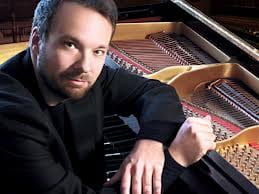 On February 23, the Chopin Foundation of the United States and the Rosenstiel School of Marine & Atmospheric Science team up to present pianist Adam Aleksander in recital. The concert will be followed by a sumptuous catered reception with wine.
On February 23, the Chopin Foundation of the United States and the Rosenstiel School of Marine & Atmospheric Science team up to present pianist Adam Aleksander in recital. The concert will be followed by a sumptuous catered reception with wine.
February 23, 2014 | 4 pm
Piano recital by Adam Aleksander
Rosenstiel School of Marine & Atmospheric Science
4600 Rickenbacker Causeway, Key Biscayne, FL
Tickets: General $35, Chopin Members: $30, $40 at the Door.
Tickets & Info: www.chopin.org
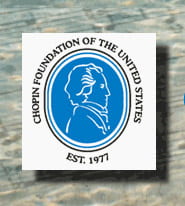 The Chopin Foundation of the United States presents the Chopin’s Birthday Concert Celebration, featuring Sergei Babayan, piano and the Amernet String Quartet. Internationally acclaimed Armenian-American pianist Babayan will perform a selection of Chopin’s solo piano music as well as Dvorak’s Piano Quintet with the Amernet String Quartet.
The Chopin Foundation of the United States presents the Chopin’s Birthday Concert Celebration, featuring Sergei Babayan, piano and the Amernet String Quartet. Internationally acclaimed Armenian-American pianist Babayan will perform a selection of Chopin’s solo piano music as well as Dvorak’s Piano Quintet with the Amernet String Quartet.
Saturday, March 1, 2014 | 8:00 PM
Chopin’s Birthday Concert Celebration in Miami
Manuel Artime Theater
900 SW First Street, Miami, FL
Tickets: tickets.completeticketsolutions.com or 877-318-0073 – $35/$25/members $30/students & under 22 Free
Info: www.chopin.org or 305-868-0624
[Sources: press release, chopin.org]
Contributors: Terry Tegnazian, Jadwiga Gewert
PWM Has The Floor…
 In early January, Meakultura published an interview with Daniel Cichy, Editor-in-Chief at PWM. In it, Dr. Cichy, a noted musicologist and music critic, answers a wide range of questions pertaining to his life and career, posed by journalist Maria Majewska. Daniel Cichy admits that his current appointment at PWM was something he didn’t really seek, but was happy to accept once the positions was offered to him. It represented a big change in his career up to that point but also a chance to provide the PWM publishing house with a new vision on how to continue the operations of this venerable institution under the present cultural and financial conditions.
In early January, Meakultura published an interview with Daniel Cichy, Editor-in-Chief at PWM. In it, Dr. Cichy, a noted musicologist and music critic, answers a wide range of questions pertaining to his life and career, posed by journalist Maria Majewska. Daniel Cichy admits that his current appointment at PWM was something he didn’t really seek, but was happy to accept once the positions was offered to him. It represented a big change in his career up to that point but also a chance to provide the PWM publishing house with a new vision on how to continue the operations of this venerable institution under the present cultural and financial conditions.
Much remains to be done and Dr. Cichy’s agenda for the near future includes work on renovating the PWM’s properties in Warsaw, stabilizing the financial situation of the publishing house, and fostering a closer relationship with a number of contemporary Polish composers. One of Chief Editor’s projects includes expanding the book side of the PWM catalogue and focusing on educational publications, a much-needed and underserved area in Poland, according to Dr. Cichy. His other, important mission of increasing the catalogue of composers already begins to bear fruit, with scores by Sławomir Kupczak, Aleksander Nowak, Wojciech Widłak, Maciej Zieliński, Wojciech Ziemowit-Zych, and Agata Zubel now being published under the PWM aegis.
Plans for the coming years include promoting music of women composers, beginning with Grażyna Bacewicz, and celebrating the opus of Kazimierz Serocki in 2015 and Tomasz Sikorski in 2016. In his interview, Dr. Cichy also expresses a firm belief that, in spite of many small-scale publishing houses currently operating in Poland, PWM is still the biggest, most important player, with the largest catalogue, worldwide contacts, and unique provider of concert materials for hire.
[Source: http://meakultura.pl/]
Jagodziński’s Chopin
In the February issue of Meakultura, Aleksandra Masłowska extensively analyses the phenomenon of Chopin’s popularity among jazz musicians. Starting with Mieczysław Kosz and the Novi Singers in the early 1970s, jazz reinterpretations of Chopin began to enter the mainstream of popular music canon, according to Masłowska. But the real leap forward came in 1994 with Andrzej Jagodziński’s Trio recording of Chopin compositions that rediscovered mazurkas, nocturnes, waltzes, etudes, polonaises and even Chopin’s monumental Op. 35 Sonata for the jazz idiom.
Reasons for Chopin’s attractiveness when it comes to jazz come from the richness of his melodies, refined harmonies, fascinating instrumental textures, and strong sense of musical structure. Masłowska sees the multitude of moods in Chopin’s music (emotionally-charged climaxes, contemplative lyrical moments, nocturnal atmosphere and improvisatory aspects—all part and parcel of the jazz realm) as the main force driving Jagodziński and his group in their inspired interpretations.
[Source: http://meakultura.pl/]
Festivals
Łańcuch XI Festival
 The annual Łańcuch [Chain] XI Witold Lutosławski Festival will be held between 26 January and 9 February 2014. Organized by the Witold Lutosławski Society in Warsaw, this year is the 10th anniversary of the Festival. Concerts will be held in the Grand Hall of the Royal Castle, Bristol Hotel , Polish Radio’s Witold Lutosławski Concert Studio.
The annual Łańcuch [Chain] XI Witold Lutosławski Festival will be held between 26 January and 9 February 2014. Organized by the Witold Lutosławski Society in Warsaw, this year is the 10th anniversary of the Festival. Concerts will be held in the Grand Hall of the Royal Castle, Bristol Hotel , Polish Radio’s Witold Lutosławski Concert Studio.
Launched in 2004, the Festival focuses on the music by one of Poland’s leading 20th-century composers performed by the ensembles and soloists who used to work closely with him. This year, the event coincides with the conclusion of the 2013 Lutosławski Year marking the centenary of the composer’s birth and with the 20th anniversary of his death (7 February 2014).
In addition to Lutosławski’s music, the programme of Chain XI includes works by several Polish composers Wojciech Kilar, Andrzej Panufnik, Aleksander Tansman, and Zbigniew Bargielski, as well as by Per Nørgård, Kaija Saariaho, Arne Nordheim, Toru Takemitsu and Natalya Chepelyuk. ‘Aria II’ by Natalya Chepelyuk (Belarus) won Third Prize at the 2013 Witold Lutosławski International Composers’ Competition. Its performance on 9 February will be its world premiere.
Featured ensembles include the National Polish Radio Symphony Orchestra in Katowice (cond. Alexander Liebreich), Apollon Musagète Quartett, the Polish Radio Symphony Orchestra in Warsaw (cond. Renato Rivolta), Lutosławski Piano Duo, and the AUKSO Chamber Orchestra of the town of Tychy (cond. Marek Moś). Several prominent soloists are also billed, such as Bartłomiej Wezner (piano), Eugeniusz Knapik (piano), Aleksandra Kuls (violin), Jakob Kullberg (cello), Jakub Waszczeniuk (trumpet), and Anna Broda (dulcimer).
For more information visit: http://www.lutoslawski.org.pl/
The Witold Lutosławski Festival – Chain XI
Concerts in Polish Radio’s Witold Lutosławski Studio.
Sunday, 26 January 2014, 19.00
Performers: Apollon Musaget Quartett: Paweł Zalejski violin; Bartosz Zachlod violin; Piotr Szumieł viola; Piotr Skweres cello and Bartłomiej Wezner piano.
Programme: Zbigniew BARGIELSKI – Landscape of memories (Witold Lutosławski in memoriam) for violin, cello and piano; Charles Bodman RAE – String Quartet No. 2 in tribute to Witold Lutosławski; Witold LUTOSŁAWSKI – String Quartet, APOLLON MUSAGÈT QUARTETT – Multitude – Hommage a Witold Lutosławski.
Saturday 8 February 2014, 19.00
Symphonic concert
Performers: Polish Radio Symphony Orchestra, Renato Rivolta – conductor.
Programme: Andrzej PANUFNIK – Tragic Overture, Polonia; Witold LUTOSŁAWSKI – Little Suite (chamber version), Chain III; Aleksander TANSMAN – Concerto for Orchestra
Sunday, 9 February 2014, 19.00
Symphonic concert
Performers: National Polish Radio Symphony Orchestra in Katowice, Alexander Liebreich – conductor.
Programme: Andrzej PANUFNIK – Lullaby, Autumn Music; Natalya CHEPELYUK – Aria II (world premiere); Wojciech KILAR – Prelude and Christmas Carol; Witold LUTOSŁAWSKI – Livre pour orchestra.
[Sources: studianagran.com.pl]
Awards
Grammy Award for W. Pawlik & The Kalisz Philharmonic
 Jazz composer and pianist Włodek Pawlik won the 2013 Grammy Award in the “Best Large Jazz Ensemble” category for the album ‘Night in Calisia’ (Summit Records 612). He shared this honor with his trio, American trumpeter Randy Brecker (with whom Pawlik has collaborated since 2008) and the Kalisz Philharmonic. While accepting the award at the ceremony in Los Angeles on January 26, he proudly announced “I would like to add that the entire production of this album was created in Poland. This is a Polish product.”
Jazz composer and pianist Włodek Pawlik won the 2013 Grammy Award in the “Best Large Jazz Ensemble” category for the album ‘Night in Calisia’ (Summit Records 612). He shared this honor with his trio, American trumpeter Randy Brecker (with whom Pawlik has collaborated since 2008) and the Kalisz Philharmonic. While accepting the award at the ceremony in Los Angeles on January 26, he proudly announced “I would like to add that the entire production of this album was created in Poland. This is a Polish product.”
Włodek Pawlik, born 1958 – pianist and composer. He is a graduate of the Frederic Chopin Academy of Music in Warsaw where he completed his classical piano class under the direction of Barbara Hesse-Bukowska in 1984. He also studied jazz composition, theory and arrangement at the Hochschule für Music in Hamburg (Germany) graduating in 1990. He won many music competition’s prizes including the first place in instrumentalist category at the International Jazz Competition in Dunkirk (France, 1984) and a second place at the International Composers’ Competition in Monaco (1988).
He has released over 24 original records under his own name to date, and also performed live at the most prestigious jazz festivals. His artistic activities along his phonographic output made him widely recognizable in media and professional journals. ‘The Age’ daily newspaper hailed his tour of Australia a primary musical event of 2002. The opinion-forming magazine ‘Down Beat’ reviewed his ‘Turtles’ CD album (featuring Randy Brecker on the trumpet) giving the excellent mark.
Włodek Pawlik actively works as a composer of symphonic music, concert forms, vocal-instrumental forms (opera ‘Via Sancta’ premiered in 2007 at the Polish National Opera in Warsaw, music for William Shakespeare’s sonnets), ballets (‘Flow’), theatrical and movie soundtracks (‘Crows’, ‘Nightwatching’, ‘Time To Die’, ‘Rewers’, ‘Mistification’). He won numerous prizes for his music achievements, including the 2005 Fryderyk (Misterium Stabat Mater), Polish national television cultural channel award 2006 for the best jazz-rock project (‘Anhelli’ trio album), “best movie soundtrack” award at the Polish Film Festival in Gdynia (‘Rewers’ soundtrack), and the Orły 2010 (‘Rewers’ soundtrack). ‘Night in Calisia’ was also nominated for the 2013 Fryderyk in the “Best Jazz Album” category.
Włodek Pawlik obtained his doctorate degree from the Frederic Chopin University of Music in Warsaw in 2007, where he regularly delivers an academic course on improvisation. Also, he was frequently invited to give clinics and master classes at the Eastman School of Music, the Western Michigan University, the Royal Conservatory of Brussels and during the IAJE Jazz Conference in Los Angeles. He was also a jury member at the 5th American Jazz Piano Competition in Indianapolis (2001).
[Sources: thenews.pl, wlodekpawlik.com, grammy.com]
New Nat’l Student Conductors Competion
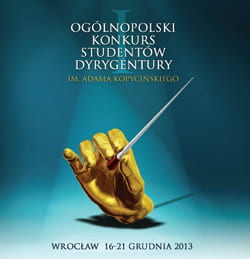 From December 16-21, 2013, the National Adam Kopyciński Competition for Student Conductors was held at the Academy of Music in Wrocław. Adam Kopyciński was a distinguished conductor, composer and pianist, the former Rector of the Academy, and the conductor and director of the Wrocław Opera.
From December 16-21, 2013, the National Adam Kopyciński Competition for Student Conductors was held at the Academy of Music in Wrocław. Adam Kopyciński was a distinguished conductor, composer and pianist, the former Rector of the Academy, and the conductor and director of the Wrocław Opera.
Organized by the Conducting Department of the Academy of Music in Wrocław in celebration of the jubilee 65th anniversary of the Academy, the jury of this first edition of the Competition was comprised of prof. Marek Pijarowski , prof. Tadeusz Strugała , prof. Warcisław Kunc , prof. Tomasz Bugaj , prof. Wojciech Michniewski, prof. Jan Wincenty Hawel and prof. Elżbieta Wiesztordt.
The winners were:
- First Prize: Dawid Jarząb
- Second Prize: David Runtz
- Third prize: Adam Domurat
- Honorable Mentions: Paweł Kapuła, Wojciech Pławner and Łukasz Wódecki
The Competition is organized and co-sponsored by PWM.
[Sources: pwm.com.pl, amuz.wroc.pl]
2014 Polityka ‘Passports’ Awarded
 Polityka Magazine’s 2013 ‘Passport’ in the Classical Music category was awarded to the Apollon Musagète Quartett for consistently and effectively building a strong position in Europe’s musical life while always including Polish music in the repertoire, and for the outstanding “Multitude” album. The ensemble was founded in 2006 in Vienna, where its members (mainly graduates of the Warsaw Academy of Music) continued their chamber music studies with the renowned Alban Berg Quartet. The quartet features violinists Paweł Zalejski and Bartosz Zachłod, violist Piotr Szumieł, and cellist Piotr Skweres. All the musicians are around 30 years of age.
Polityka Magazine’s 2013 ‘Passport’ in the Classical Music category was awarded to the Apollon Musagète Quartett for consistently and effectively building a strong position in Europe’s musical life while always including Polish music in the repertoire, and for the outstanding “Multitude” album. The ensemble was founded in 2006 in Vienna, where its members (mainly graduates of the Warsaw Academy of Music) continued their chamber music studies with the renowned Alban Berg Quartet. The quartet features violinists Paweł Zalejski and Bartosz Zachłod, violist Piotr Szumieł, and cellist Piotr Skweres. All the musicians are around 30 years of age.
Among others, the quartet has won the prestigious ARD International Music Competition in Munich (2008) and gave performances in New York’s Carnegie Hall, the Berlin Philharmonic, the Herkulessaal and Gasteig in Munich, the Wigmore Hall in London, the Tonhalle in Zurich, and the Konzerthaus and Musikverein in Vienna. The quartet also makes forays outside classical music, recording the “Night of Hunters” album in 2011 with Tori Amos for Deutsche Grammophon. In 2013, the ensemble released the “Multitude” album (Decca), which includes quartets by the great Polish composers whose anniversaries were celebrated last year: Witold Lutosławski, Henryk Mikołaj Górecki and Krzysztof Penderecki, and “Multitude,” a piece composed by the quartet members and inspired by Lutosławski’s work.
[Sources: beethoven.org.pl, polityka.pl]
Discography
New On Acte Préalable
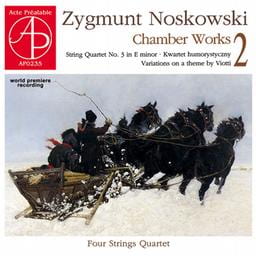 Zygmunt Noskowski: Chamber works 2
Zygmunt Noskowski: Chamber works 2
Zygmunt Noskowski (1846-1909): String Quartet No. 3; Variations on a theme by Viotti; Humorous Quartet; Vis a vis for violin and cello.
Four Strings Quartet: Lucyna Fiedukiewicz, 1st violin; Grzegorz Witek, 2nd violin; Beata Raszewska, viola; Łukasz Tudzierz, cello
AP 0235
 New CD From Sony Classical
New CD From Sony Classical
Witold Lutosławski : Complete Works for Piano Solo
Ewa Kupiec, piano
http://klassik.sonymusic.de/Ewa-Kupiec/Lutoslawski/P/2953492
http://www.ewakupiec.com/
R. Panufnik – In The Studio & On The Shelves
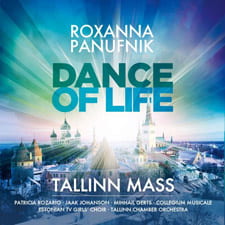 Roxanna Panufnik – Dance of Life: Tallinn Mass
Roxanna Panufnik – Dance of Life: Tallinn Mass
Patricia Rozario – singer; Jaak Johanson – actor; Laura Lindpere –kannel; Madis Metsamart – percussion; Mihhail Gerts – conductor; Estonian TV Girls’ Choir, Aarne Saluveer – choirmaster; Collegium Musicale Chamber Choir and Choir of Estonian Academy of Music & Theatre, Endrik Üksvärav – choirmaster; Tallinn Chamber Orchestra
Warner Classics 2564 64281-9 (Feb 2013)
Polish-British composer and daughter of Andrzej Panufnik, Roxanna Panufnik, has prepared the definitive recording of her celebrated large-scale choral work Dance of Life: Tallinn Mass, which was commissioned by the Tallinn Philharmonic Society to celebrate the city’s ascension to European Capital of Culture in 2011. It was an undertaking that involved three choirs, an orchestra, singer and actor soloists, several choirmasters, and a conductor, as well as the composer/producer Panufnik and her collaborating producer Philip Rowlands. The challenging but rewarding recording process is discussed by Caroline Gill in this month’s Gramophone Magazine, and the final product was released on Warner Classics Records on February 3, 2013.
[Sources: gramophone.co.uk, amazon.co.uk, tallinnmass.com]
Moss, Rappé & Opium String Qtet On Cd Accord
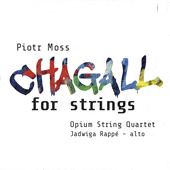 MOSS, P.: Chagall for Strings
MOSS, P.: Chagall for Strings
Piotr Moss: String Quartet No. 4, “Chagall”; Le lien entre les jours ; Dedication.
Jadwiga Rappé, mezzo-soprano; Opium String Quartet
CD Accord ACD195 (Feb 2014
Polish composer Piotr Moss – a former student of Nadia Boulanger – brings into the 21st century a neoclassical legacy with its calligraphic understanding of style, its attention to harmonic design and its penchant for simultaneously crystalline and hybrid forms.
The music of the “Chagall” quartet is not an illustration of the artist’s paintings in a literal sense. Instead it evokes their atmosphere, themes and rhythms. It was necessary for the work to contain many familiar and repetitive motifs from the artist’s creative output as e.g.: a pair of lovers, a circus, war or events from the life of Russian Jews.
[Sources: naxos.com, prestoclassical.co.uk]
Tysman’s Exploration Of Chopin Continues
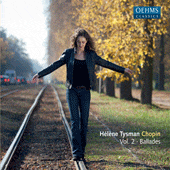 Tysman plays Chopin, Vol. 2
Tysman plays Chopin, Vol. 2
Frédéric Chopin: Ballades / Mazurkas, Op. 24 / Barcarolle / Polonaise-fantaisie
Hélène Tysman, piano
Oehms Classics OC894 (Jan 2014)
French pianist Hélène Tysman first broke out onto the international music scene as a laureate of the 16th International Chopin Piano Competition in Warsaw. She is hailed as “poetic” by The Daily Telegraph, praised for her Chopin interpretation which “mixed excitement with eloquence” by the Gramophone.
[Sources: naxos.com, prestoclassical.co.uk]
Performances
Chopin And Szymanowski On Mezzo
The viewers of the French TV station Mezzo had a chance to see concerts of music by Szymanowski and Chopin. Their January 21 broadcast of London Symphony Orchestra led by Valery Gergiev featured two of Szymanowski’s popular works, the Second Violin Concerto with Leonidas Kavakos, violin, and Symphonie Concertante for Piano and Orchestra with pianist Denis Matsuev. Gergiev and the LSO, together with the London Symphony Chorus were back with Szymanowski’s Third Symphony, “Song of the Night” on TV Mezzo on January 26. Both of these concerts were recorded at London’s Barbican Hall in December 2012.
Chopin’s Second Piano Concerto, featuring pianist Nelson Freire and English Chamber Orchestra led by Jacek Kaspszyk was aired on Mezzo on January 27. This concert was originally recorded in August of 2010 at the Roque d’Anthéron Festival in France.
[Source:http://www.pwm.com.pl/]
Ending Of The Lutosławski Year In Warsaw
 On January 25 the National Philharmonic presented a concert officially closing the Lutosławski Centenary Year. Maestro Jacek Kaspszyk celebrated the occasion by leading the Philharmonic in Lutosławski’s Fourth Symphony. The program also included Haydn’s Trumpet Concerto with soloist Gábor Boldoczki, and two war horses by Brahms—the Haydn Variations and Symphony No. 3.
On January 25 the National Philharmonic presented a concert officially closing the Lutosławski Centenary Year. Maestro Jacek Kaspszyk celebrated the occasion by leading the Philharmonic in Lutosławski’s Fourth Symphony. The program also included Haydn’s Trumpet Concerto with soloist Gábor Boldoczki, and two war horses by Brahms—the Haydn Variations and Symphony No. 3.
The Lutosławski Year opened with a January 2013 concert featuring Anne-Sophie Mutter and, during thirty concerts throughout the year, the entire symphonic opus and a substantial portion of Lutosławski’s chamber music was heard at the Philharmonic. Such noted artists as Gidon Kremer, Krzysztof Penderecki, Ian Bostrigde, Tugan Sokhiev, Vladimir Ashkenazy, Katia and Marielle Labèque, Stanisław Skrowaczewski, and Antoni Wit appeared as guest soloists and conductors. In addition to these performances, London’s Philharmonia Orchestra led by Esa-Pekka Salonen presented an all-Lutosławski program in March of 2013 and Krystian Zimerman was the featured soloist in Lutosławski’s Piano Concerto heard during the Warsawska Jesień Festival in September.
[Source: http://www.pwm.com.pl/]
Anniversaries
Born This Month
- 2 February 1909 – Grazyna BACEWICZ , composer, violinist, pianist (d. 1969)
- 7 February 1877 – Feliks NOWOWIEJSKI, composer, organist
- 8 February 1953 – Mieszko GÓRSKI, composer, teacher (active in Gdansk and Koszalin)
- 9 February 1954 – Marian GORDIEJUK, composer, teacher, theorist (active in Bydgoszcz)
- 14 February 1882 – Ignacy FRIEDMAN, pianist and composer (d. 1948)
- 18 February 1881 – Zygmunt MOSSOCZY, opera singer (bass), chemist (d. 1962)
- 27 February 1898 – Bronislaw RUTKOWSKI, organist, music critic, conductor and composer (d. 1964)
- 28 February 1910 – Roman MACIEJEWSKI , composer, pianist (d. 1998 in Sweden)
- 28 February 1953 – Marcin BŁAŻEWICZ, composer, teacher (active in Warsaw
Died This Month
-
3 February 1959 – Stanisław GRUSZCZYŃSKI, tenor (active throughout Europe, b. 1891)
-
3 February 1929 – Antoni Wawrzyniec GRUDZIŃSKI, pianist, teacher, and music critic (active in Lódz and Warsaw, b. 1875)
-
7 February 1954 – Jan Adam MAKLAKIEWICZ, composer (active in Warsaw, b. 1899)
-
7 February 1994 – Witold LUTOSŁAWSKI, composer and conductor (b. 1913)
-
8 February 1909 – Mieczysław KARŁOWICZ, composer, conductor, writer (b. 1876)
-
9 February 1959 – Ignacy NEUMARK, composer and conductor (active in Copenhagen, Oslo and Schveningen, b. 1888)
-
10 February 1905 – Ignacy KRZYŻANOWSKI, pianist and composer (active in Kraków and Warsaw, b. 1826)
-
14 February 1957 – Wawrzyniec Jerzy ŻULAWSKI, composer, music critic, teacher, and mountain climber (b. 1916)
-
15 February 2010 – Adam KACZYŃSKI, pianist, composer and creator of the MW2 new music ensemble (b. 13 October 1933)
-
15 February 2010 – Marek JASIŃSKI, composer and professor in Bydgoszcz (b. 1949)
-
23 February 1957 – Stefan ŚLĄZAK, singer, organist, conductor (active in Silesia, b. 1889)
-
27 February 1831 – Józef KOZLOWSKI, composer (active at the Russian Court in Petersburg, b. 1757)
-
29 February 2004 – Witold RUDZIŃSKI, composer, music critic and teacher




